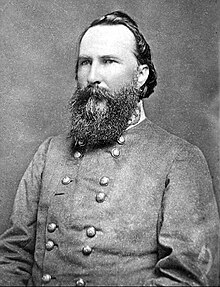 |
| General James Longstreet |
MISSIONARY RIDGE, October 30, 1863.
His Excellency JEFFERSON DAVIS,
Savannah, Ga.:
On the night of 26th the enemy crossed a force to this side of river below Lookout Mountain and drove Lonsgtreet's outpost back. As soon as informed, I directed him to retake the position. Failing to do so during the day of 27th, I renewed the order at night, placing his two and Walker's division at his disposal, and directed the troops to move before daylight. The attack was not made up to 10 a. m., when Longstreet joined me on Lookout Mountain, where I went to witness. I learned no disposition were made for it. [At] 12 m. a column of the enemy, probably two brigades, appeared on the road from Bridgeport and formed a junction with the forces which had crossed. The cavalry on the left under Longstreet had given no notice of this move. That night (the 28th) Longstreet asked for another division as a support to his attacking column. It was given. He informed me he should attack with one brigade. I ordered him not to do so with less than a division. He moved a division to the vicinity, but attacked with one brigade, surprised the enemy and routed him, but he rallied on finding the small attacking force, drove it back with heavy loss, and secured his position. We have thus lost our important position on the left, and the enemy holds the railroad within six miles of Chattanooga, and from there, by dirt road and pontoon bridge, to the rear of his position. He has brought forward heavy re-enforcements by this route.
BRAXTON BRAGG.
Official Records, Series I., Vol. 52, Part 2, Page 566.
Longstreet had, by failing to use sufficient force in Lookout Valley to prevent Hazen's securing the Brown's Ferry landing, cost the Confederates a chance to starve out the Union force. He then delayed obeying Bragg's positive orders to counterattack, and when he did employed only a part of his force when he could have used his entire corp and overwhelmed the Union force. Afterwards, he blamed his own officers, and preferred charges against Evander Law (later dropped due to the needs of the service). Those who would defend Longstreet, and lay his postwar reputation at the feet of "The Lost Cause Narrative", fail to consider that when he went West the same patterns of delay, poor deployment, and denial of responsibility went with him.
No comments:
Post a Comment